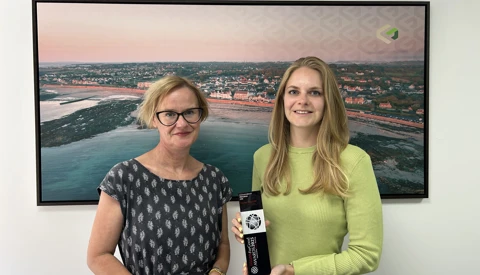Guernsey’s financial services sector could leverage its unique position to harness technology in driving growth and improving efficiency, according to speakers at a technology conference.
Speakers at Finovation: The Guernsey Edge - a conference jointly hosted by the Guernsey Financial Services Commission (GFSC) and Guernsey Finance, discussed the opportunities and risks presented to the financial services sector by developments in AI and technology.
GFSC Director General William Mason opened the conference by discussing Guernsey’s position: "For Guernsey to keep its place as a leading international finance centre, we must be both open to technology and we must also be inquiring and understand the limitations and risks associated with it."
In a session titled ‘UK FinTech - much ado about nothing,’ Tim Jones CBE, Executive Director of Tata Ltd, discussed the market trends shifting the dial in UK FinTech, including developments in the digital cash sector.
Discussions then shifted to quantum computing, which has the potential to create economic benefits for the financial services sector, according to Simon Fried, VP of Marketing at Classiq.
He said: “There is no question of whether quantum computing is going to be impactful, it's a question of how much and when.”
As well as the ability to have a dramatic impact on discovering new materials, solving diseases, and finding ESG solutions, Simon said the financial services sector can harness quantum computing for anomaly detection, fraud detection, and more accurate risk modelling.
"Every industry has cause to start exploring quantum opportunities. When it comes to financial services, there's no limit to the types of investigations.
“We’re emerging from the noisy, intermediate scale of quantum computing into the utility era – when certain types of use cases will be able to deliver ROI that is better than traditional computers.”
As well as the potential benefits of technology, speakers at the conference covered the need to mitigate cyber risk.
Guy O'Keefe and David Shone, both Partners at international law firm Slaughter and May, focused on the risks associated with business opportunities for financial institutions through technology and AI developments.
Cyber breaches can be severe for financial institutions, Guy said, and preparedness for them is key.
He said: “Cyber is a corporate governance risk, and the risk landscape is constantly changing. It's important to identify, reflect and accept that risk, and satisfy that you have sufficient processes in place to mitigate that risk. Be aware of regulatory expectations, look at what's happening in the landscape, and adapt policies and preparation accordingly.”
With cyber risk an area of focus for regulators globally, David emphasised the importance of ensuring that appropriate financial crime controls are in place, as well as ensuring the safety and stability of the broader financial crime ecosystem.
Panellists from the GFSC, including Katherine Jane, Alison Gavey, Caroline Bradley, Conor Osborough, and Ryan Warne from development partner d-fine, outlined plans for how the Commission is using technology to digitise the applications and authorisation process, making it easier for people to do new business in the Bailiwick.
The new authorisation and applications portal, which has been hailed as ‘transformative,’ will position the Bailiwick as a tech-enabled international finance centre.
Alison Gavey, Co-Director of Authorisations and Innovation at the Guernsey Financial Services Commission, said: “Anything that we as a regulator can do to make it more attractive and easier to do business in Guernsey will be beneficial.”
'Tech in the real world' panellists Alexis Augier, Founder and CEO at Vega, and Matt Ong, Founder and CEO at Ctrl Alt, highlighted the openness of Guernsey to cutting edge innovations in the financial services sector.
Both panellists praised the GFSC’s openness to innovation.
On domiciling in Guernsey, Matt said the benefits include a strong financial services sector including fund administration, and innovative structures such as Private Investment Funds or Protected Cell Companies.
He said: “There has been a lot of grey area when it comes to tokenisation. Innovators need clarity, so the GFSC’s guidance has been very helpful.
"These innovations require an open conversation on both sides of the table. That is fundamental.”
Alexis echoed this sentiment: “For us it was a matter of speed to market and cost-effectiveness. We benchmarked different jurisdictions, and Guernsey was the fastest and the most inclined to embrace technology.”
He also touched on the evolving interests of high-net-worth individuals, noting a rise in interest in asset allocation.
The Lord Sedwill KCMG, former Cabinet Secretary and Head of the Civil Service, joined the conference to discuss the challenges and opportunities presented by the new Government.
He discussed the challenges of the economic environment against the backdrop of emerging technology and AI.
He said: "New kinds of economies and the sheer impact of technological revolution will be hugely positive for humanity.”
On the challenges of net zero targets across the globe, he said: “It is important given the salience of climate change that business and regulators are applying standards.”
The conference then heard about machine learning algorithms for investment funds from Dr Dan Brown of University College London.
Dan outlined how algorithmic management is hoped to outperform passive indices in a low-risk way using AI technology.
He praised the professionals and regulator in Guernsey: “Guernsey has a very pragmatic, positive can-do attitude. It has been a pleasure to work with the GFSC and the advisors in Guernsey.”
In closing, Barnaby Molloy, Deputy Chief Executive of Guernsey Finance, said: "The rapid development of technology means it is already starting to directly impact our personal and professional lives.
“As a leading global financial centre, our strengths across substance, combined with agility, means Guernsey can tackle these challenges head on and realise opportunities.”







